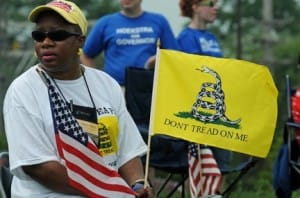Tea Party Republicans well-informed about GOP presidential field

Tea Party Republicans, and even Republican-leaning Independents, know more about the current GOP presidential candidates than Republican voters who disagree with or have no opinion of the Tea Party movement. According to a survey released Thursday by the Pew Research Center for the People and the Press, 73% who classify themselves as Republican and who agree with the Tea Party movement correctly answered at least three of four questions posed about certain candidates, while 53% answered all four correctly.

Pew asked the national sample of 1,507 U.S. adults and 1,165 registered voters a series of four questions regarding some of the Republican candidates and the primary process in randomized order. The questions measured whether voters knew which state Mitt Romney formerly governed, which candidate served as Speaker of the U.S. House of Representatives, which candidate opposes U.S. military involvement in Afghanistan, and which state holds the next primary after the Iowa caucuses and the New Hampshire primary.
90% of Tea Party-affiliated respondents agreed that Newt Gingrich was former Speaker of the House. 78% said that Mitt Romney was the former governor of Massachusetts, 74% knew that Congressman Ron Paul opposes military involvement in Afghanistan, and 69% said that South Carolina is the next primary.
Among Republicans and Republican-leaning voters who don’t identify with the Tea Party, 76% said that Gingrich was the former Speaker, 59% said that Romney was the former Massachusetts governor, 51% knew about Paul’s Afghan war position, and 50% knew that South Carolina is the primary that follows New Hampshire’s. Just 31% of non- Tea Party Republican voters knew the correct answers to at least three of the questions, and only 18% knew the answers to all four questions posed.
An interesting item to note in this latest Pew survey is that there wasn’t a sample of voters affiliated with the Occupy Wall Street movement. Given that it sprang up in various metropolitan cities across the U.S. in 2011, it would have been interesting to examine their current views of the political system in light of their knowledge of the GOP presidential field. In addition, it would have been a noteworthy comparison to measure the Occupy movement’s level of engagement in knowing about the Republican candidates against that of the Tea Party, since these two people-initiated movements arguably share some common ground (like being opposed to Wall St. bailouts).
Pew’s survey had a margin of error of 3.5% when dealing with both the total sample of 1,507 U.S. adults and the sample of 1,165 registered voters. When dealing with Republican and Republican-leaning voters, it had a margin of error of 5.5%. There was a 95% level of confidence for the different groups in the survey.


